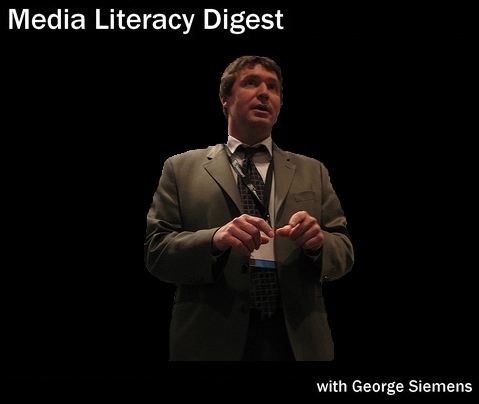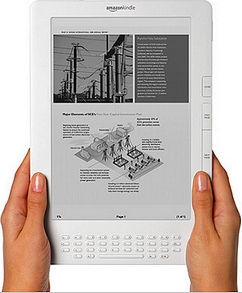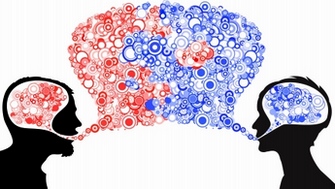Media Literacy: Making Sense Of New Technologies And Media by George Siemens - Jun 13 09
Inside this Media Literacy digest: Develop a critical attitude. Filter the media buzz. Learn to separate the news from the noise and make sense of the information that interests you. Here is George SiemensMedia Literacy digest: learning, networks, knowledge, technology, trends by George Siemens I’ve been in Italy for about a week - first a trip to Milan to present at theInternational Enterprise 2.0 conference organized by Open Knowledge. Videos of presentations are available on the official site (most are in English, even though titles are in Italian. I presented on Knowledge without Management). Useful case studies of emerging technology implementations were presented in the afternoon. After Milan, I went to Rome for a few days of sight seeing and generally consuming food. I found an interesting illustration of "old meets new" in Castel Sant’Angelo. An exhibit - Luminescenze 2009 (see images on Flickr) was held near the top floor. The use of QR codes, facebook, flickr, etc. offered a stark contrast to the need to physically “be there” to experience the ambiance of the castle. Each offers a value point - neither is fully complete without the other. Transformative changes in other information-based industries should capture the attention of educators. A few recent newspaper-related stories: I think you could replace newsroom references with classrooms... Discussions of language results in controversy that falls broadly into two camps: Chomsky, Pinker, and others occupy the innate camp and numerous others occupy a camp that can be described as social-interactionist, connectionist, and emergent. This debate will not be resolved any time soon. The idea of language adds an interesting perspective on speaking and toolmaking as similar / related activities: Toolmaking also requires hands capable of shaping tools, while speech requires a throat capable of vocalization.” Reading through the article, I was surprised how much the discussion on language shares with general discussions of learning… I’ve long enjoyed Chris Lott’s contribution to learning and technology. He brings his passion of poetry, philosophy, and technology into an informed world view. First time I met him face to face, we spent time arguing about Prensky (he challenged my notion that Prensky took edutech in the wrong direction. Chris argued that for a time, Prensky gave voice to a distinction that many were beginning to notice). Chris is a critic and an idealist (which is a positive). I just came across a presentation he delivered titled From Plato to Perl: the Problem of Sociality and the 'Idea'. He explores the mechanical predecessors of the digital age (fascinating to think about the many "near hits" in what eventually became the internet). A critical argument is advanced at about the 15:30 mark on how we are erroneously applying "mechanisms that we don’t understand", "retaining the least productive mechanisms" of scholarship and humanism and applying mechanical approaches to education. If you prefer text to video, similar ideas are expressed in this paper.Media literacy is the ability to analyze and evaluate the media to which we are exposed; it is a complex subject. Although most of us suffer from sensory over-stimulation from media, most do not have the time, or do not take the time, to analyze the consequences of this exposure. (Source: University of New Mexico)

Photo credit: Teemu Arina edited by Daniele BazzanoeLearning Resources and News
Old Meets New

That Failing Newspaper Industry...

“The stats show that total newspaper ad sales dropped by an unprecedented 28.28% in the first quarter of 2009, a deep plunge that represents a loss of more than $2.6 billion in ad revenue compared year-over-year.”
“But we’re hiding much of our newsrooms’ value behind a terribly anachronistic format: voiceless, incremental news stories that neither get much traffic nor make our sites compelling destinations. While the dispassionate, what-happened-yesterday, inverted-pyramid daily news story still has some marginal utility, it’s mostly a throwback at this point - a relic of a daily product delivered on paper to a geographically limited community.”
Tool Making and Language

“The ingredients of speaking and toolmaking are similar. Both require a brain capable of complex imitation and a community that wants to share information.
From Plato To Perl: The Problem of Sociality and The 'Idea'

Good use of stories and example throughout the talk (Babbage, Tennyson).
Originally written by George Siemens for elearnspace and first published on Jun 12th, 2009 in his newsletter eLearning Resources and News.
Publicadas por
Jorge Alberto Hidalgo Toledo
a la/s
11:51 a.m.
![]()
Etiquetas: media literacy



















No hay comentarios.:
Publicar un comentario